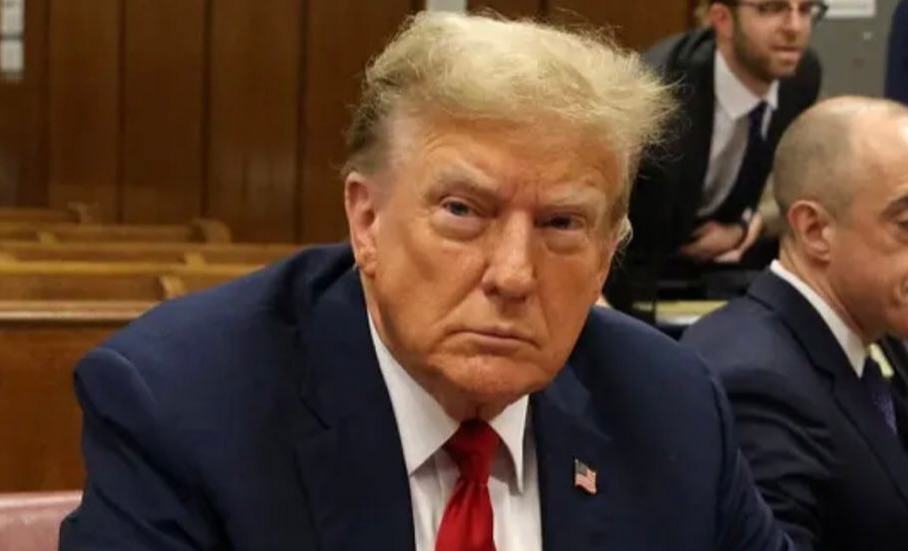Donald Trump becomes the first former U.S. president convicted of felony crimes, as a New York jury finds him guilty of charges related to a 2016 election hush money scheme.

On Thursday, Donald Trump became the first former American president to be convicted of felony crimes as a New York jury found him guilty on all 34 charges related to a scheme to influence the 2016 election illegally. This involved a hush money payment to a porn actor who claimed they had a sexual encounter.
Trump remained stone-faced as the verdict was read, while cheers from outside the courthouse echoed through the hallways. The decision came after over nine hours of jury deliberation.
Also Read:- American Airlines Resets Strategy as Vasu Raja Departs Amid Corporate Booking Debacle
Following the verdict, an indignant Trump labeled the trial as “rigged” and “disgraceful.” He told reporters that the real verdict would be decided by voters on November 5, implying that the public knew what had truly happened.
Judge Juan M. Merchan scheduled the sentencing for July 11, just before the Republican National Convention, where Trump is expected to be the GOP nominee despite the verdict.
This conviction is a significant legal setback for Trump, exposing him to potential prison time. It marks a dramatic turn in his journey from a real estate mogul to reality TV star and president. As Trump attempts to reclaim the White House in the upcoming election, this judgment poses a critical test for voters regarding their acceptance of his controversial behavior.
Trump plans to appeal the verdict. He attended a Manhattan fundraiser on Thursday evening, which was scheduled before the verdict, and is expected to continue his fundraising activities. His campaign quickly leveraged the verdict to raise funds, depicting him as a “political prisoner.”
The charges of falsifying business records could result in up to four years in prison. However, Manhattan District Attorney Alvin Bragg did not specify whether he would seek imprisonment, and it remains uncertain if the judge would impose such a sentence even if requested.
Also Read:- Robert De Niro Blasts Trump as ‘Clown’ Threatening Democracy at Biden Campaign Event
Despite the conviction, Trump remains eligible to continue his presidential campaign. This case, among three other felony indictments he faces, is likely the only one to conclude before the November election, underscoring its importance. The political ramifications of the verdict are ambiguous, potentially solidifying existing opinions about Trump rather than changing them.
For another candidate, a criminal conviction might doom a presidential bid. However, Trump has previously survived two impeachments, numerous allegations, and investigations. The details of this case have been known to the public for years and are seen by many as less serious than other charges he faces, including those related to subverting democracy and mishandling national security secrets.
Trump’s campaign argued that the jury’s decision would not influence voters, who would prioritize issues like inflation. Nevertheless, the verdict offers President Joe Biden and Democrats an opportunity to argue Trump’s unfitness for office. The White House, however, issued only a muted statement respecting the rule of law. Conversely, Trump will likely use the decision to bolster claims of political victimization.
Throughout the trial, Trump maintained his innocence and criticized the proceedings, often violating a gag order with inflammatory comments. His lawyer, Todd Blanche, indicated plans to appeal, citing the judge’s refusal to recuse himself and excessive pretrial publicity.
Republicans, including House Speaker Mike Johnson, continued to support Trump, condemning the trial as a political maneuver.
The trial, a landmark moment for the American judicial system, involved accusations that Trump falsified business records to conceal a hush money payment to Stormy Daniels. This payment was made by Trump’s former lawyer, Michael Cohen, to secure Daniels’ silence during the final weeks of the 2016 campaign, allegedly to interfere with the election. The payments were later recorded as legal expenses, which prosecutors argued was an unlawful cover-up.
Also Read:- White House Defends Israel Amid Escalation in Rafah, Clarifies ‘Red Line’ Stance
Trump’s defense claimed the payments were legitimate legal expenses and denied the sexual encounter. They argued that hush money deals were driven by personal, not political, motives and sought to discredit Cohen, suggesting he was motivated by personal animosity and a desire for fame.
The trial featured compelling testimonies, including from Daniels and Cohen, who provided insights into the hush money scheme and Trump’s involvement. Cohen’s testimony linked Trump directly to the charges, describing a detailed reimbursement plan for the hush money.
Despite being criticized by some legal experts as the weakest case against Trump, this trial’s significance is heightened by its timing, potentially being the only one to reach a conclusion before the election. Other pending cases against Trump are delayed by legal complexities.
